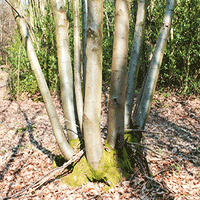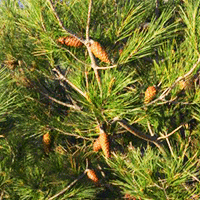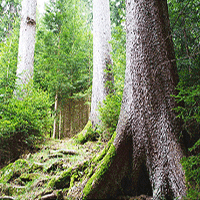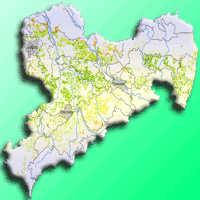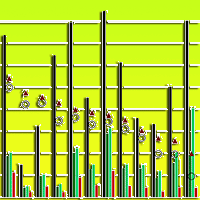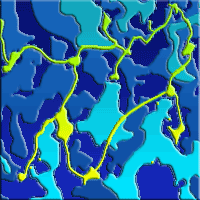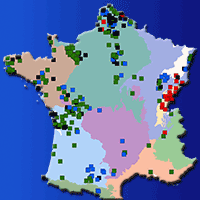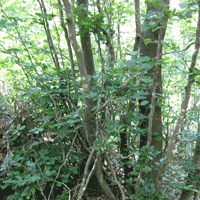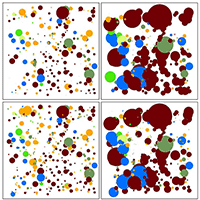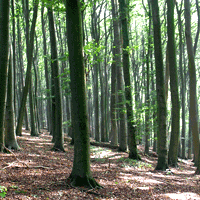
Small forest parcels, management diversity and valuable coppice habitats: an 18th century political compromise in the Osnabrück region (NW Germany) and its long-lasting legacy
iForest - Biogeosciences and Forestry, Volume 9, Issue 4, Pages 518-528 (2016)
doi: https://doi.org/10.3832/ifor1834-009
Published: Mar 17, 2016 - Copyright © 2016 SISEF
Research Articles
Collection/Special Issue: IUFRO division 8.02 - Mendel University Brno (Czech Republic) 2015
Coppice forests: past, present and future
Guest Editors: Tomas Vrska, Renzo Motta, Alex Mosseler
Abstract
This study underlines the often under-estimated importance of forest ownership and land tenure in European forest biodiversity studies which are crucial for the management, structure, and tree species composition of woodland. In particular it is assumed that, in regions with both state-owned forests and smaller private forests, the latter contain more relict habitats shaped by historical woodland management practices. A government decree of 1721, a political compromise, was crucial to the present-day woodland ownership pattern and distribution of woodland habitats in the Osnabrück region (northwest Germany). It resulted in the privatization of woodlands held in common for centuries and created a huge number of small, private forest parcels in the 18th century. These developments are discussed in relation to Europe-wide processes in forest affairs. Mainly due to the low economic importance of these forest parcels, as well as the individualism of the forest owners, coppice structures providing valuable habitats have persisted until today. For instance, over-aged coppice stands provide important habitat conditions for saproxylic species and unique herbaceous layers. These valuable habitats must be protected while creating new coppice stands to eventually take their place in future decades. Management plans for Natura 2000 sites in the Osnabrück region should address this problem while reconciling any conflict of interests between private owners and nature conservation organizations. Researchers are encouraged to give more consideration to the important relationship between current woodland biodiversity and the history of forest ownership patterns.
Keywords
Biodiversity Conservation, Forest History, Forest Ownership, Forest Policy, Historical Ecology, Land Tenure, Nature Conservation, Silviculture
Authors’ Info
Authors’ address
Northwest German Forest Research Institute, Department A (Forest Growth), Section Forest Conservation and Natural Forest Research, Grätzelstraße 2, D-37079 Göttingen (Germany)
Corresponding author
Paper Info
Citation
Mölder A (2016). Small forest parcels, management diversity and valuable coppice habitats: an 18th century political compromise in the Osnabrück region (NW Germany) and its long-lasting legacy. iForest 9: 518-528. - doi: 10.3832/ifor1834-009
Academic Editor
Andrea Cutini
Paper history
Received: Aug 31, 2015
Accepted: Feb 22, 2016
First online: Mar 17, 2016
Publication Date: Aug 09, 2016
Publication Time: 0.80 months
Copyright Information
© SISEF - The Italian Society of Silviculture and Forest Ecology 2016
Open Access
This article is distributed under the terms of the Creative Commons Attribution-Non Commercial 4.0 International (https://creativecommons.org/licenses/by-nc/4.0/), which permits unrestricted use, distribution, and reproduction in any medium, provided you give appropriate credit to the original author(s) and the source, provide a link to the Creative Commons license, and indicate if changes were made.
Web Metrics
Breakdown by View Type
Article Usage
Total Article Views: 56506
(from publication date up to now)
Breakdown by View Type
HTML Page Views: 46128
Abstract Page Views: 3823
PDF Downloads: 5021
Citation/Reference Downloads: 20
XML Downloads: 1514
Web Metrics
Days since publication: 3616
Overall contacts: 56506
Avg. contacts per week: 109.39
Citation Metrics
Article Citations
Article citations are based on data periodically collected from the Clarivate Web of Science web site
(last update: Mar 2025)
Total number of cites (since 2016): 9
Average cites per year: 0.90
Publication Metrics
by Dimensions ©
Articles citing this article
List of the papers citing this article based on CrossRef Cited-by.
References
Ernst August II., Bischof von Osnabrück, Herzog von Braunschweig-Lüneburg [Ernest Augustus II, Bishop of Osnabrück, Duke of Brunswick-Lüneburg]. In: “Allgemeine Deutsche Biographie, Band 48“ (Historische Commission bei der königl. Akademie der Wissenschaften ed.). Duncker and Humblot, Leipzig, Germany, pp. 399-402.
Gscholar
Forst und Jagd im Osnabrücker Raum vom 18. Jahrhundert bis zur Gegenwart [Forestry and hunting in the Osnabrück region from the 18th century until today]. Osnabrücker Mitteilungen 77: 125-161.
Gscholar
Digitales Landbedeckungsmodell für Deutschland: DLM-DE [Digital land cover model for Germany: DLM-DE]. Bundesamt für Kartographie und Geodäsie, Frankfurt am Main, Germany, pp. 16.
Gscholar
The management of common land in north-western Germany. In: “The management of common land in northwest Europe, c. 1500-1850” (De Moor M, Shaw-Taylor L, Warde P eds). Brepols Publishers, Turnhout, UK, pp. 225-245.
Gscholar
Ecology and management of coppice woodlands. Springer Science and Business Media, Dordrecht, The Netherlands, pp. 336.
Gscholar
Die “Theilforsten” und ihre Zusammenlegung zu Wirthschaftsverbänden in den Fürstenthümern Osnabrück und Hildesheim, mit Rücksicht auf das Waldschutzgesetz vom 6. Juli 1875 [The “fragment forests” and their consolidation into management associations in the Princedoms of Osnabrück and Hildesheim (…)]. Aus dem Walde - Mittheilungen in zwanglosen Heften 7: 100-162.
Gscholar
Die Wälder des Meßtischblattes Iburg, Teutoburger Wald. Eine pflanzensoziologische, ökologische und forstkundliche Studie [The woodlands of the map sheed “Iburg“, Teutoburg Forest. A study on phytosociology, ecology and forestry]. Abhandlungen aus dem Westfälischen Museum für Naturkunde 15: 1-91.
Gscholar
Zur Pflanzen- und Tierwelt des Kleinen Berges [Flora and fauna of the Kleiner Berg area]. Suderberger Hefte 4: 81-97.
Gscholar
“A windfall for the magnates” - The development of woodland ownership in Denmark c. 1150-1830. University Press of Southern Denmark, Odense, Denmark, pp. 432.
Gscholar
Coppiced woodlands: their management for wildlife (2nd edn). Joint Nature Conservation Committee, Peterborough, UK, pp. 29.
Gscholar
Kohlenbergbau im Feld “Hilterberg” bei Bad Iburg im Teutoburger Wald [Coal mining in the “Hilterberg“ coal field near Bad Iburg, Teutoburg Forest]. Iburger Hefte 3: 1-40.
Gscholar
Mittelwald als Agroforstsystem zwischen geordneter Nachhaltigkeit und Gestaltungsvielfalt - Eine historische Studie [The “Mittelwald” - an agroforestry system between rigid sustainability and creative options. A historical study]. Allgemeine Forst- und Jagdzeitung 181: 64-71.
Gscholar
FFH: Waldbauern fordern bessere Entschädigung [Natura 2000: Forest owners demand better compensation]. Neue Osnabrücker Zeitung, 24 May 2014, pp. 23.
Gscholar
Das Osnabrücker Land im 18. und 19. Jahrhundert - Eine kulturgeographische Untersuchung [The Osnabrück region in the 18th and 19th century. A cultural-geographical study]. Verlag Gerhard Stalling, Oldenburg i. O., Germany, pp. 171.
Gscholar
Die heutige Bewaldung Deutschlands [The current forest cover of Germany]. Paul Parey, Berlin, Germany, pp. 52.
Gscholar
Waldzusammensetzung und Waldbehandlung im Niedersächsischen Tiefland westlich der Weser und in der Münsterschen Tieflandsbucht bis zum Ende des 18. Jahrhunderts [Woodland composition and management in the western lowlands of Lower Saxony and in the Westphalian bight until the end of the 18th century]. Decheniana, Beiheft 11: 1-304.
Gscholar
Biological diversity: the coexistence of species. Cambridge University Press, Cambridge, UK, pp. 681.
Gscholar
Naturführer Teutoburger Wald - Pflanzen, Tiere, Fossilien [Field guide to the Teutoburg Forest - plants, animals, fossils]. Schriftenreihe der Interessengemeinschaft Teutoburger Wald e.V. 2: 1-304.
Gscholar
Von den Gutsherrn und Erbexen in Rücksicht auf das Markenrecht [On the lords and the Erbexen under consideration of the legal system of the Marken]. Johann Wilhelm Kißling, Osnabrück, Germany, pp. 114.
Gscholar
Alphabetisches Handbuch der besonderen Rechte und Gewohnheiten des Hochstifts Osnabrück mit Rücksicht auf die benachbarten westfälischen Provinzen. I. Band [Alphabetical handbook of the special rights and customs of the Prince-Bishopric of Osnabrück under consideration of the neighboring Westphalian provinces. Volume I]. Karl und Compagnie, Osnabrück, Germany, pp. 354.
Gscholar
Alphabetisches Handbuch der besonderen Rechte und Gewohnheiten des Hochstifts Osnabrück mit Rücksicht auf die benachbarten westfälischen Provinzen. II. Band [Alphabetical handbook of the special rights and customs of the Prince-Bishopric of Osnabrück under consideration of the neighboring Westphalian provinces. Volume II]. Karl und Compagnie, Osnabrück, Germany, pp. 366.
Gscholar
Niedersächsische Forstgeschichte: Eine integrierte Kulturgeschichte des nordwestdeutschen Forstwesens [Forest history of Lower Saxony (…)]. Selbstverlag Heimatbund Rotenburg, Rotenburg, Germany, pp. 965.
Gscholar
Landkreis kompakt 2014 - Daten, Fakten, Informationen [The Osnabrück region in short - data, facts, information]. Landkreis Osnabrück, Osnabrück, Germany, pp. 24.
Gscholar
Codex constitutionum Osnabrugensium oder Sammlung von Verordnungen, gemeinen Bescheiden, Rescripten und anderen erläuterenden Verfügungen, welche das Hochstift Osnabrück betreffen [Codex constitutionum Osnabrugensium or collection of decrees (…) which are related to the Prince- Bishopric of Osnabrück]. Kißling, Osnabrück, Germany, pp. 860.
Gscholar
Integrating forest management into conservation objectives: coppice management and forest habitats in Natura 2000 and Emerald network sites. In: “Coppice Forests: Past, Present and Future - Conference Information, Program and Book of Abstracts” (Vild O ed). Mendel University, Brno, Czech Republic, pp. 67.
Gscholar
Die Anfänge der Waldpflege und Forstkultur im Mittelalter unter der Einwirkung der lokalen Waldordnung in Deutschland [The beginnings of forest management in the Middle Ages under the influence of local forest organization in Germany]. Forstwissenschaftliches Centralblatt 87: 75-100.
CrossRef | Gscholar
Der Verfall und die Aufteilung der gemeinen Marken im Fürstentum Osnabrück bis zur napoleonischen Zeit [On the decline and division of the commons in the Princedom of Osnabrück until the Napoleonic times]. Mitteilungen des Vereins für Geschichte und Landeskunde von Osnabrück 49: 1-157.
Gscholar
Der Wald in Niedersachsen - Ergebnisse der Bundeswaldinventur 3 [Woodland in Lower Saxony - Results of the third national forest inventory]. Niedersächsisches Ministerium für Ernährung, Landwirtschaft und Verbraucherschutz, Hannover, Germany, pp. 55.
Gscholar
Eine hochmittelalterliche Bischofsvita als wertvolle Quelle zur Wald- und Vegetationsgeschichte - Die “Vita Bennonis” des Norbert von Iburg [A high medieval bishop’s vita as a valuable source on vegetation and forest history - Norbert von Iburg’s “Vita Bennonis”]. Forstarchiv 80: 203-207.
CrossRef | Gscholar
Flora und Vegetation im Naturwald “Großer Freeden”, Teutoburger Wald [Flora and vegetation of the strict forest reserve “Großer Freeden”, Teutoburg Forest]. Natur und Heimat 66: 33-48.
Gscholar
33 Jahre nach dem letzten Hieb - Zur Entwicklung der Bestandesstruktur im Naturwald “Großer Freeden” (Teutoburger Wald) [33 years after the last felling: On the development of stand structure in the strict forest reserve “Großer Freeden” (Teutoburg Forest, Germany)]. Allgemeine Forst- und Jagdzeitung 180: 195-205.
Gscholar
Die Verbreitung von gefährdeten Holz bewohnenden Käfern in Schleswig-Holstein unter dem Einfluss von Forstgeschichte und Besitzstruktur [The distribution of endangered saproxylic beetles in Schleswig- Holstein (Northern Germany) as influenced by forest history and land tenure]. Forstarchiv 85: 84-101.
Gscholar
250 Jahre zentrale Forstverwaltung im Osnabrücker Land [250 years of centralized forest administration in the Osnabrück region]. Heimatjahrbuch Osnabrücker Land 2016: 250-255.
Gscholar
Urwald relict species - Saproxylic beetles indicating structural qualities and habitat tradition. Waldökologie online 2: 106-113.
Gscholar
Offener Brief zum FFH-Gebiet “Kleiner Berg” [Open letter regarding the Natura 2000 area “Kleiner Berg“]. Naturschutzbund Osnabrück e.V., Osnabrück, Germany, pp. 2.
Gscholar
Governing the commons: the evolution of institutions for collective action. Cambridge University Press, Cambridge, UK, pp. 298.
Gscholar
Agricultural revolution in England: the transformation of the agrarian economy, 1500-1850. Cambridge University Press, Cambridge, UK, pp. 274.
Gscholar
The role of cultural ecosystem services in landscape management and planning. Current Opinion in Environmental Sustainability 14: 28-33.
CrossRef | Gscholar
Die Buchenwaldgesellschaften im nordwestlichen Weserbergland [The beech forest communities of the northwest Weserbergland]. Siedlung und Landschaft in Westfalen 29: 1-131.
Gscholar
Der Einfluß der Niederholzwirtschaft auf die Physiognomie und die floristisch-soziologische Struktur von Kalkbuchenwäldern [The influence of coppicing on the physiognomy and phytosociological structure of calcareous beechwoods]. Tuexenia 1: 233-242.
Gscholar
Dividing the land: early American beginnings of our private property mosaic. University of Chicago Press, Chicago, USA, pp. 432.
Gscholar
Ancient woodland: its history, vegetation and uses in England. New ed. Castlepoint Press, Dalbeattie, UK, pp. 624.
Gscholar
Holzverknappung und Krisenbewußtsein im 18. Jahrhundert [Wood shortage and crisis consciousness in the 18th century]. Geschichte und Gesellschaft 9: 513-543.
Gscholar
Landesherr und Landstände im Hochstift Osnabrück in der Mitte des 18. Jahrhunderts [Sovereign and estates in the Price-Bishopric of Osnabrück in the middle of the 18th century]. Veröffentlichungen des Max-Planck-Instituts für Geschichte 19: 1-156.
Gscholar
Die bäuerliche Siedlung des Ravensberger Landes bis 1770 (Nachdruck der 1. Auflage von 1938) [Rural settlement in the Ravensberg region until 1770 (2nd edn). Selbstverlag von der Geographischen Kommission für Westfalen, Münster, Germany, pp. 172.
Gscholar
Ländliche Alltagsgeschichte und lokale Geschichtsvermittlung: Die Bad Laer Geschichte in der Neuzeit [Rural everyday history and the local mediation of history: the history of Bad Laer in the modern era]. Dissertation, University of Oldenburg (Oldb.), Germany, pp. 476.
Gscholar
Private forest ownership in Europe. Geneva Timber and Forest Study Papers 26: 1-110.
Gscholar
Niederwaldnutzung im westlichen Teutoburger Wald - Zwischenbericht zur vegetationskundlichen Erfolgskontrolle [Coppicing in the western Teutoburg Forest (…)]. Bericht im Auftrag der Interessengemeinschaft Teutoburger Wald e.V. (Ig Teuto), Lengerich, Germany, pp. 16.
Gscholar
Der Waldzustand im Teutoburger Wald bei Halle (Westf.) im 16 Jahrhundert [The forest condition in the Teutoburg Forest near Halle (Westf.) in the 16th century]. Natur und Heimat 23: 9-15.
Gscholar
1609-2009: 400 Jahre Grenze zwischen Ostenfelde und Lienen [1609-2009: The border between Ostenfelde and Lienen becomes 400 years old]. Books on Demand, Norderstedt, Germany, pp. 72.
Gscholar
Saproxylic invertebrates and their conservation. Nature and Environment Series 42: 1-81.
Gscholar
Die alternative Sukzession im Hochstift Osnabrück. Bischofswechsel und das Herrschaftsrecht des Hauses Braunschweig-Lüneburg in Osnabrück 1648-1802 [The “alternative succession” in the Prince-Bishopric of Osnabrück (…) 1648-1802]. Osnabrücker Geschichtsquellen und Forschungen 47: 1-283.
Gscholar
Die Geschichte des Hochstifts Osnabrück bis zum Jahre 1508 - Aus den Urkunden bearbeitet [The history of the Prince-Bishopric of Osnabrück until 1508 (…)]. Verlag der Kißling’schen Druckerei, Osnabrück, Germany, pp. 481.
Gscholar
Die Geschichte des Hochstifts Osnabrück - Aus den Urkunden bearbeitet. Zweiter Theil. Von 1508 bis 1623 [The history of the Prince-Bishopric of Osnabrück (…), 1508-1623]. Friedrich Frommann, Jena, Germany, pp. 880.
Gscholar
Erfassung und Akquise schützenswerter Bereiche und Einzelobjekte im Kellenberg (Landkreis Osnabrück) - ein Beitrag zum Naturschutz im Wirtschaftswald [Registration and acquisition of valuable areas and single objects in the Kellenberg (Osnabrück region)]. Osnabrücker naturwissenschaftliche Mitteilungen 38: 125-151.
Gscholar
Elfhundert Jahre Geschichte der Erpener Mark - 951 bis 1951 [1100 years of history in the Mark of Erpen - 951 until 1951]. H. Beucke and Söhne, Dissen T. W., Germany, pp. 276.
Gscholar
Instrumente zur Information und Motivation von Kleinprivatwaldbesitzern zur Umsetzung von Pflege- und Nutzungsmaßnahmen in ihrem Wald: deskriptive Explorationsstudien zu Möglichkeiten der Holzmobilisierung [Instruments for the information and motivation of private forest owners for disposing them to use and maintain their forests]. Dissertation, Albert-Ludwig University Freiburg (Breisgau), Germany, pp. 219.
Gscholar
Grenzsteine erzählen Iburger Geschichte(n). Eine Dokumentation historischer Grenzsteine in Bad Iburg [(…) A documentation of ancient boundary stones in Bad Iburg)]. Verein für Orts- und Heimatkunde Bad Iburg e. V., Bad Iburg, Germany, pp. 279.
Gscholar
Bestandesvorrat, Baumartenvielfalt und Struktur kleinparzellierter Privatwälder im Hainich [Growing stock, diversity of tree species and structure of stripped private-owned forests in the Hainich region, Thuringia, Germany]. Forstarchiv 82: 203-215.
CrossRef | Gscholar
Die forstlichen Verhältnisse des Wiehen-Gebirges und Vorschläge zur Verbesserung derselben [The forestal conditions of the Wiehengebirge and recommendations for their improvement]. Zeitschrift für das Forst- und Jagdwesen 2: 110-127.
Gscholar
Landwirtschaft und Agrarverfassung im Fürstentum Osnabrück nach dem Dreißigjährigen Kriege - Eine wirtschaftsgeschichtliche Untersuchung staatlicher Eingriffe in die Agrarwirtschaft [Agriculture and agrarian constitution in the Princedom of Osnabrück after the Thirty Years’ War (…)]. Gustav Fischer, Stuttgart, Germany, pp. 159.
Gscholar

